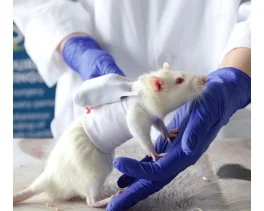Authors
Kayser V, Viguier F, Melfort M, Bourgoin S, Hamon M, Masson J
Lab
Centre de Psychiatrie et Neurosciences, INSERM UMR 894, Paris F-75014, France
Journal
Neuroscience.
Abstract
Extensive pharmacological evidence supports the idea that glutamate plays a key role in both acute and chronic pain. In the present study, we investigated the implication of the excitatory amino acid in physiological nociception by using mutant mice deficient in phosphate-activated glutaminase type 1 (GLS1), the enzyme that synthesizes glutamate in central glutamatergic neurons. Because homozygous GLS1-/- mutants die shortly after birth, assays for assessing mechanical, thermal and chemical (formalin) nociception were performed on heterozygous GLS1+/- mutants, which present a clear-cut decrease in glutamate synthesis in central neurons. As compared to paired wild-type mice, adult male GLS1+/- mutants showed decreased responsiveness to mechanical (von Frey filament and tail-pressure, but not tail-clip, tests) and thermal (Hargreaves plantar, tail-immersion and hot-plate tests) nociceptive stimuli. Genotype-related differences were also found in the formalin test for which GLS1+/- mice exhibited marked decreases in the nociceptive responses (hindlimb lift, lick and flinch) during both phase 1 (0-5 min) and phase 2 (16-45 min) after formalin injection. On the other hand, acute treatment with memantine (1mg/kg i.p.), an uncompetitive antagonist at NMDA glutamate receptors, reduced nociception responses in wild-type but not GLS1+/- mice. Conversely, antinociceptive response to acute administration of a low dose (1mg/kg s.c.) of morphine was significantly larger in GLS1+/- mutants versus wild-type mice. Our findings indicate that genetically driven hypoactivity of central glutamatergic neurotransmission renders mice hyposensitive to nociceptive stimulations, and promotes morphine antinociception, further emphasizing the critical role of glutamate in physiological nociception and its opioid-mediated control.
Keywords/Topics
Domaines de recherche divers
Source :

 Douleur - Allodynie/Hyperalgésie Thermique
Douleur - Allodynie/Hyperalgésie Thermique Douleur - Spontanée - Déficit de Posture
Douleur - Spontanée - Déficit de Posture Douleur - Allodynie/Hyperalgésie Mécanique
Douleur - Allodynie/Hyperalgésie Mécanique Apprentissage/Mémoire - Attention - Addiction
Apprentissage/Mémoire - Attention - Addiction Physiologie & Recherche Respiratoire
Physiologie & Recherche Respiratoire




































 Douleur
Douleur Système Nerveux Central (SNC)
Système Nerveux Central (SNC)  Neurodégénérescence
Neurodégénérescence Système sensoriel
Système sensoriel Système moteur
Système moteur Troubles de l'humeur
Troubles de l'humeur Autres pathologies
Autres pathologies Système musculaire
Système musculaire Articulations
Articulations Métabolisme
Métabolisme Thématiques transversales
Thématiques transversales Congrès & Meetings
Congrès & Meetings